Redditor Asks If Stealing Back Her Dog From Neighbors Makes Her The Bad Guy
One of the responsibilities of pet ownership is to keep your dog from being stolen. Dogs are valuable and can be targeted by thieves. To protect their pets, dog owners should take precautions, such as keeping their dogs indoors or in a secure, fenced yard when they are not home.
Dogs should also be kept on a leash when outside of the home or fenced yard to prevent them from wandering off or being taken. But what should you do when the thieves are your neighbors?
OP's dog slipped through a hole in the fence that she was unaware of. She searched for her dog for about 3-4 hours before posting on the neighborhood Facebook page asking for any information.
The dog had tags on, so there could be no confusion as to whom the dog belonged. The next day, OP saw her dog through her neighbor's window.
She thought they had found him and were getting ready to call her, so she knocked on their door and told them it was her dog. However, the neighbors claimed that the dog was theirs and had removed the tags that OP had put on him.
When they let the dog out back to run, OP waited until they weren't looking and called the dog over the fence to grab him. After realizing the dog was gone, the neighbors came to OP's house and knocked on her door, but she did not answer because she feared they would take the dog by force.
After 10-15 minutes of knocking, they involved the police. OP provided the police with the paperwork for the dog and explained that she had all the legal documentation.
The police helped her remove the neighbors from her property. OP told her mom what happened, but her mother thought that what she did was despicable and that she should give the dog back to the neighbors.
Other family members also believed that OP was in the wrong. OP is now questioning whether she did the right thing by taking the dog back, despite having all the legal documentation.
OP asks:

OP's dog slipped through a hole in the fence that she was unaware of.
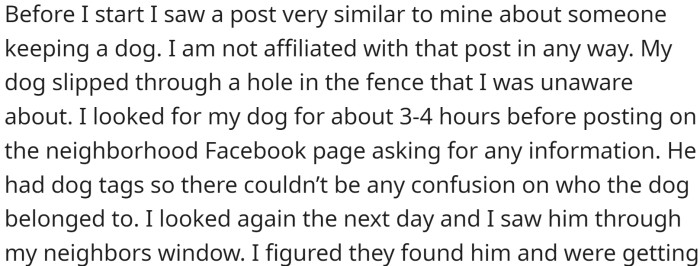
The next day, OP saw her dog through her neighbor's window. She thought they had found him and were getting ready to call her, so she knocked on their door and told them it was her dog.

The Ethics of Ownership and Attachment
Dr. Laura Mitchell, a behavioral psychologist at Harvard Medical School, explains that our attachments to pets often mirror familial bonds. Her research indicates that pets are not just animals; they often represent emotional safety and companionship. Thus, the act of reclaiming a pet can evoke strong feelings of loyalty and protection.
This situation underscores the ethical complexities that arise when ownership of a pet is disputed. It raises important questions about attachment, responsibility, and the emotional well-being of the animal involved.
The Complexity of Ownership and Trust
When it comes to pet ownership, the emotional bonds are often profound and can lead to conflicts when trust is breached.
According to the Journal of Applied Animal Welfare Science, pets are often seen as family members, and their care can evoke strong emotional responses.
This situation highlights the tension between personal feelings of ownership and the complexities of shared responsibility.
After realizing the dog was gone, the neighbors came to OP's house and knocked on her door.
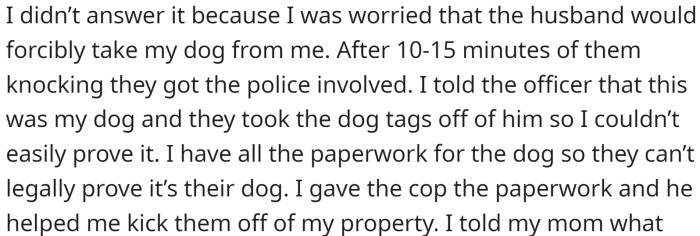
OP told her mom what happened, but her mother thought that what she did was despicable and that she should give the dog back to the neighbors.

OP has offered the following explanation for why they think they might be the a-hole:

Understanding ownership from a psychological perspective reveals the depth of attachment that individuals can form with their pets. Research from the Journal of Applied Animal Welfare Science suggests that pets fulfill emotional needs, which can lead to intense feelings of loss or betrayal when situations like this arise. When someone feels their bond is threatened, it can lead to defensive behaviors.
Addressing these feelings involves recognizing the emotional stakes in such disputes. Open communication about the pet's needs and the underlying emotional attachments can help facilitate a resolution that prioritizes the well-being of all involved.
Psychologists note that the feelings of anger and frustration in situations like these often stem from deeper issues of trust and betrayal.
Research highlights that unresolved conflicts can lead to cycles of blame and defensiveness, making it challenging to find a resolution.
In this case, the perception of theft can amplify feelings of violation, leading to heightened tensions between neighbors.
What was despicable?

OP replied:

This is an interesting question:
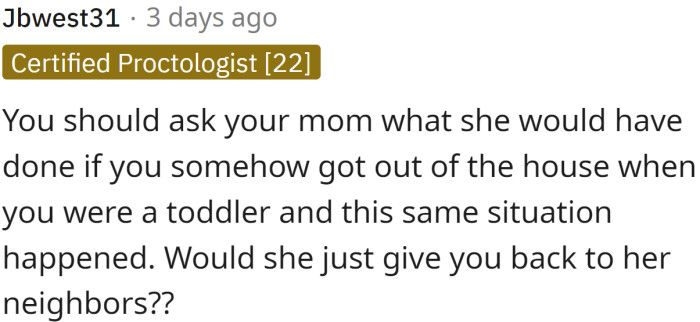
Mediating Disputes Over Pets
Conflict resolution in pet ownership disputes necessitates a sensitive approach. According to a study published in the Journal of Conflict Resolution, mediation can be an effective way to address disputes involving emotional attachments. This process allows both parties to express their feelings and come to an agreement that respects the emotional bond each has with the pet.
In practice, this might involve bringing in a neutral party to facilitate discussions about the pet's well-being rather than focusing solely on ownership rights. This encourages empathy and understanding, which are crucial for resolving such emotionally charged conflicts.
Conflict Resolution Strategies
To navigate such conflicts, experts recommend employing conflict resolution strategies that focus on collaboration rather than confrontation.
For example, having an open dialogue about the reasons for taking the pet back can help clarify intentions and promote understanding.
Additionally, mediation through a neutral party can facilitate a more constructive discussion, allowing both sides to express their feelings without escalating tensions.
Ultimately, resolving conflicts over shared pets requires patience and empathy from all parties involved.
Others found the previous comment amusing.
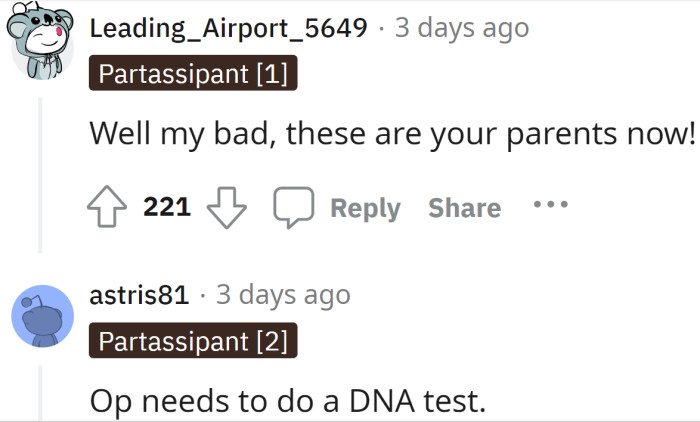
Some conspiracy theories started emerging:

Get serious now:
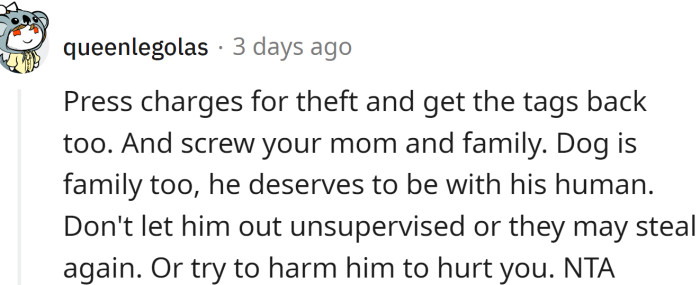
Studies in conflict resolution emphasize the importance of active listening and empathy as foundational skills in resolving disputes.
When individuals feel heard and understood, they are more likely to reach a mutually beneficial agreement.
This situation could benefit from a structured dialogue that acknowledges the emotional aspects of pet ownership.
OP should get the dog microchipped.
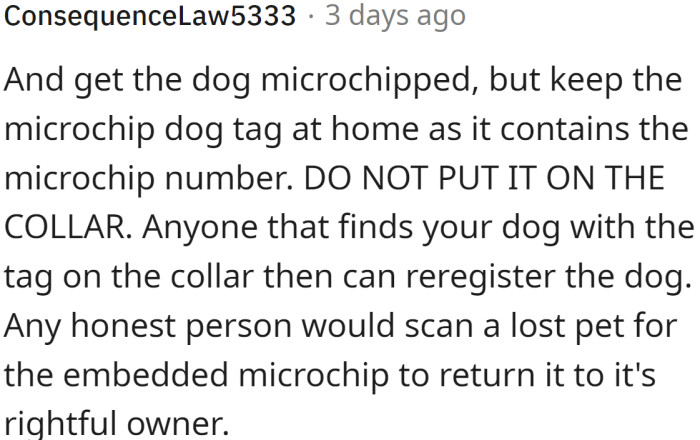
Others agree:

The bottom line is:
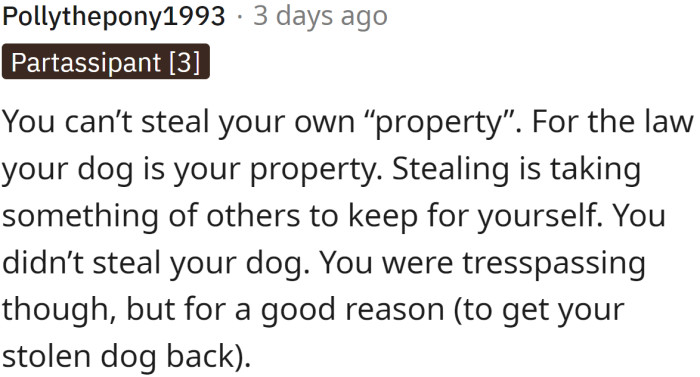
The story of OP's lost dog highlights the importance of responsible pet ownership, particularly in terms of ensuring that dogs are properly secured in their yards or on a leash. It also highlights the complex ethical and legal issues that can arise when pets are lost or stolen.
Most people believe that OP didn't do anything wrong when she stole back her dog. What do you think?
Psychological Analysis
This scenario illustrates the emotional intensity often tied to pet ownership, which can complicate interpersonal relationships.
It's essential to approach conflicts with empathy and a willingness to understand each other's perspectives.
Analysis generated by AI
Analysis & Alternative Approaches
Understanding the emotional stakes in shared pet ownership can help mitigate conflicts among neighbors.
Research consistently shows that open communication and empathy are vital in resolving such disputes, leading to healthier relationships.
Psychological Analysis
This situation illustrates the deep emotional connections people form with their pets, which can lead to complex disputes over ownership. It's essential to approach such conflicts with empathy and a focus on the emotional needs of all involved parties.
Analysis generated by AI
Analysis & Alternative Approaches
Disputes over pets often highlight deeper emotional attachments and ethical considerations. By focusing on mediation and open dialogue, individuals can work towards resolutions that honor their emotional connections while ensuring the well-being of the pet. Ultimately, understanding the psychological dimensions of pet ownership can lead to healthier resolutions.



